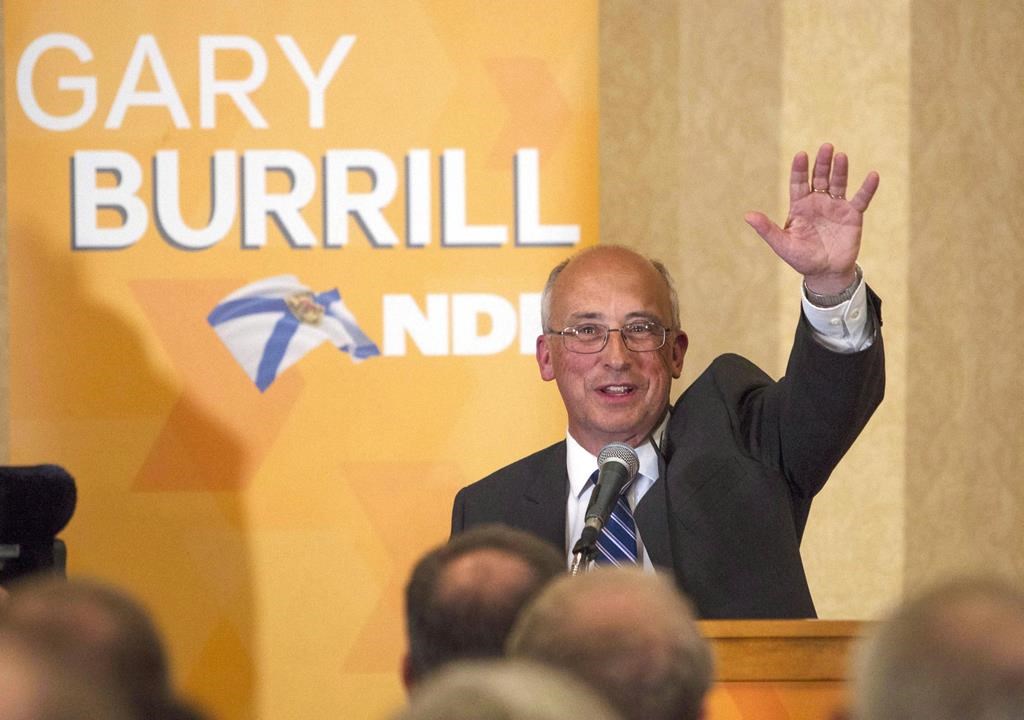As NDP Leader Gary Burrill campaigned Wednesday on the fifth day of the Nova Scotia election, he emphasized that his party would take the longest to balance budgets and would be the least cosy with big business.

It’s part of a strategy that one political scientist says the NDP needs to pursue in a field that’s crowded at the centre of the ideological spectrum, with all three major contenders promising deficit-based spending to revive the economy.
Sitting outside a small barbershop in Halifax’s north end – in a capital district that’s been key to the party’s past success – the 65-year-old United Church minister said dropping a corporate tax break introduced by the Liberals would be among his party’s top priorities if elected to govern in the Aug. 17 vote.
Ever since former Liberal premier Stephen McNeil sliced the rate from 16 to 14 per cent last year, with an estimated annual cost to the public purse of about $70.5 million, Burrill has argued against the move.
“We’re at a time when government in fact needs to have … the funds to be able to provide the leadership to bring us out of the great COVID contraction,” he said in an interview with The Canadian Press outside the shop.
READ MORE: Nova Scotia election kicks off, NDP releases political ‘vision document’
“The tax break was folly,” he said, dismissing the Liberal argument that it was needed at a time when the province had some of the highest corporate tax rates in the country.
A Liberal party spokeswoman replied in an email Wednesday that lower tax rates attract business, allowing for hiring and economic growth, and noted that the last budget also lowered the small business tax rate by half a percentage point to 2.5 per cent, the lowest in the region.

Get breaking National news
Burrill also distinguishes his party from the Liberals in his commitment to deficit spending. He said returning to balance in four years, as the Liberal plan projects, is “a very short time period.”
And the leader critiques the Progressive Conservative proposal to provide tax breaks to companies in exchange for higher wages, saying “companies ought to pay taxes properly and have to pay their employees properly; they ought to do both.”
The NDP has consistently placed third in polls since its crushing 2013 descent from power, when it lost the majority of its seats after a single term in office. It held just five of the legislature’s 51 seats at dissolution.
But David Johnson, a political science professor at Cape Breton University, said in an interview Tuesday the NDP has a “decent” chance of rebounding.
“Here in Nova Scotia, most all of these parties are broadly centrist. We still have Conservatives with the Progressive Conservative moniker in their party name,” he said. “The NDP is appealing to a centre-left perspective. We see that in their promotion of policies of increasing corporate taxes and wanting to impose permanent rent controls.”
While other pandemic-era provincial races have favoured incumbents, Johnson says Liberal Leader Iain Rankin “is not Stephen McNeil,” who presided with authority over the first, tense wave of the virus.
As a result, Johnson said the campaign may evolve into a referendum on the personal qualities and communication styles of Rankin, Tory Leader Tim Houston and Burrill, rather than the pandemic’s muted impact.
“It comes down to leadership, and on this issue, it’s a much more open race,” he said.

The Liberals continued the traditional style of campaigning on Wednesday, with Rankin, who was in Antigonish, promising to twin sections of two of Nova Scotia’s busiest highways – a northern portion of Highway 104, and portions of Highway 103 along the province’s south shore.
Tory Leader Tim Houston held his usual morning news conference at party headquarters, highlighting the party’s plans to build long-term care rooms, before heading off to campaign with candidates.
As the campaign’s first week continues, Johnson notes that Burrill appears likely to benefit from Nova Scotians’ affinity for kindly leaders.
The NDP leader has been beginning most days with staged discussions with local shop owners, or citizens struggling to find an apartment, rather than formal presentations of policy. That approach is no accident, says Johnson.
“Here in Nova Scotia, to do well you have to be perceived as kind, friendly and avuncular, a person who comes across as your favourite, trusted uncle,” he said.
This report by The Canadian Press was first published July 21, 2021.







Comments